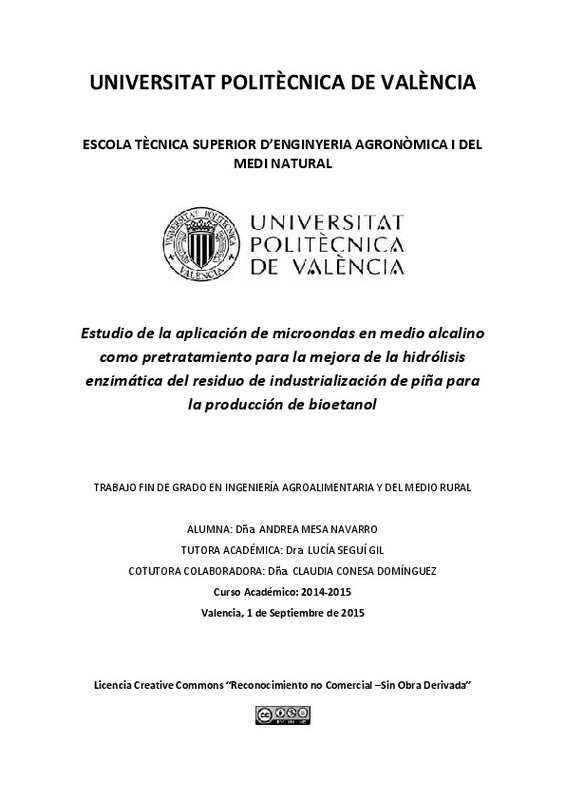|
Resumen:
|
[ES] La biomasa residual de origen industrial es una fuente prometedora para la obtención de bioetanol gracias, entre otros motivos, a su disponibilidad y a la posibilidad de dar valor añadido a un producto de desecho. No ...[+]
[ES] La biomasa residual de origen industrial es una fuente prometedora para la obtención de bioetanol gracias, entre otros motivos, a su disponibilidad y a la posibilidad de dar valor añadido a un producto de desecho. No obstante, la matriz lignocelulósica necesita ser pretratada e hidrolizada para liberar los azúcares fermentables. Por otra parte, los pretratamientos y la hidrólisis pueden liberar al medio una cantidad importante de compuestos inhibitorios de la fermentación tales como los compuestos fenólicos. Se ha comprobado que las microondas, solas o combinadas con bases, incrementan la cantidad de azúcares liberados al medio durante la hidrólisis enzimática posterior. En este trabajo se pretende averiguar las temperaturas alcanzadas durante el tratamiento por microondas, determinar la cantidad de compuestos fenólicos liberados como consecuencia de dicho tratamiento y el efecto del pretratamiento so sobre la estructura de la matriz lignocelulósica que conforma el residuo de industrialización de la piña.
[-]
[EN] Nowadays, bioethanol is one of the most important biofuels as it can be massively obtained
and it reduces pollutant emissions into the atmosphere. Specifically, second generation
bioethanol from lignocellulosic ...[+]
[EN] Nowadays, bioethanol is one of the most important biofuels as it can be massively obtained
and it reduces pollutant emissions into the atmosphere. Specifically, second generation
bioethanol from lignocellulosic biomass wastes is a promising fuel source and it is mainly due
to its availability and potential to give additional value to waste products.
However, the lignocellulosic matrix must be pretreated and hydrolyzed in order to liberate
fermentable sugars that will produce bioethanol. Pretreatment and hydrolysis may liberate a
considerable amount of fermentation inhibitory compounds such as phenolic compounds from
lignin degradation and furfural and hydroxymethylfurfural from sugar degradation processes.
Pretreatments are important for enzymatic hydrolysis as they increase the efficiency of the
process by facilitating the access of hydrolytic enzymes into the structure. It has been found
that the amount of sugars released into the samples during the subsequent enzymatic
hydrolysis are increased by both microwave pretreatments and combined microwave-alkali
pretreatments.
The aim of this work is to determine the effect of a combined microwave-alkali
pretreatment in the subsequent enzymatic hydrolysis of pineapple waste. To this end,
different power (1.125 W / g, 4.24 W / g and 6.375 W / g) and exposure time (5 s, 10 s, 20 s, 40
s, 60 s, 120 s and 180 s) were applied. Next, the residue was characterized in terms of Total
Soluble Solids (TSS), and moisture (xw), before and after the hydrolysis. Furthermore, the
presence of fermentation inhibitory compounds (total phenols, furfural and
hydroxymethylfurfural) in the hydrolyzed residue. Finally, temperatures of the samples were
analyzed during the microwave pretreatment by means of a thermal camera. Structural
changes were latter analyzed by Cryo-SEM.
Results show that the microwave-alkaly pretreatment promote the increase of fermentable
sugars, specifically when the applied power is 4.25 W/g with the following exposure times: 10 s
and 20 s. Phenol and hydroxymethylfurfural concentrations increased as power and exposure
time were increased. This has to do with the registered temperature raise by the thermal
camera and the structural changes observed in the Cryo-SEM pictures.
As a general conclusion, this study states that the combined microwave-alkaline
pretreatment at low applied power and short exposure times promote the generation of
fermentable sugars during the enzymatic hydrolysis. In addition, subsequent fermentation
processes show low concentrations of fermentation inhibitory compounds.
[-]
|







